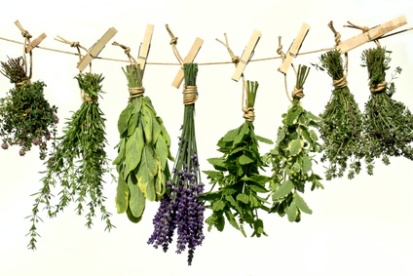Herbal Harvest
Fresh herbs at your fingertips – what could be nicer than growing your own in pots or in your garden? Growing them organically of course! I have spent a lot of time in my herb garden this week – the sun shining down on the fragrant plants has driven the bees into a frenzy – and I’ve been harvesting goodies for myself while the sun shines.
Whether it’s parsley for sauce, mint for tea or echinacea to guard against colds, herbs are one of the most beneficial types of plant you can grow in your garden. Not only do they offer you a battery of flavourings and a handy pharmacopeia – they also attract beneficial insects such as pollinating bees, and natural pest predators such as ladybirds. By growing your herbs organically, you allow the wildlife that lives in the space to multiply, and they in turn increase the productivity and health of the plants (food or otherwise) you grow.
Herbs are sturdy plants, and even the most avid pest sprayer would be unlikely to find reason to lather these beauties in chemicals. Many herbs prefer poorer, sandy soils and thrive in unfed soil – so again, those misguided folks with their spray on fertiliser stay away. Organic gardeners feed and nourish the soil, making it hearty and nutritious with manure (animal or green) and under these conditions, herbs thrive. My herb garden is huge – I admit to being a bit of a herb addict and can’t resist visiting herb gardens and nurseries nationwide.
Organic manure dug in during the autumn also helps to aerate the soil as it improves the texture. Dig in some horticultural grit to open up the soil as most herbs hate ‘wet feet.’ You can make this easier by building a small raised bed for your herbs. I made mine from slabwood, and they look just the part. Slabwood is the ‘trimmings’ left behind when a tree trunk is cut to make planks. It still has the bark attached so looks very rustic. Even better, they virtually give it away at the sawmills. Make the bed by hammering foot long pegs made from 2”x 2” timber into the ground. Then nail the slabwood to the pegs to make a box shape – and fill with your soil and grit.
Organic herbs seem to me to have a cleaner, stronger flavour. When you use the herbs to flavour your food, you are adding no chemicals and they are thus so much healthier to consume than artificial ‘flavourings’ full of E numbers and additives from a jar. You can grow herbs in pots on the windowsill or yard as well as in the garden. If your space is limited, choose carefully. You do not have to grow the obvious herbs such as chives or parsley (unless they are favourites!). Be adventurous. Not only will you discover new tastes, but you will save money as more unusual herbs can be expensive to buy – especially organic versions. Try growing sorrel, to give salads and sauces a sharp, refreshing taste. Or try chervil for adding to scrambled eggs or omelettes. Visit a herb supplier or garden and investigate the herbs that appeal to you. There may be all sorts of wonders out there that you have not discovered yet!
Don’t just dry or freeze your herbs in bags to preserve them. Add a few sprigs to a bottle of olive oil and let the flavours infuse for use in cooking. Or add crumbled leaves to a jar of sea salt to flavour soups and stews. Freeze fresh herb blossoms such as borage, violet or tansy in ice cubes to add to drinks. With a little imagination, you’ll think of many more ideas!
Invest in a good book – or several – and get reading. Most of the herbs safe to use in cookery are very easy to identify. Buy your herb plants from a reputable supplier who grows herbs according to organic principles- either in person or by mail order and you know exactly what it is you are getting. Learn the Latin names for the plants – not as hard as it sounds – as there is less room for error when you are reading and comparing different books. Suppliers will often give you factsheets or advice. If you fancy using herbal remedies, be cautious. They are wonderful, but you should seek professional advice as dosage is as important – and as potentially dangerous – as with conventional drugs. You could also consider going on a course yourself to learn more about the use of medicinal herbs. There are a variety of courses from diploma level to degree level and beyond depending on your needs.
Posted on July 7, 2013, in Uncategorized and tagged health, herbal, herbs, organic. Bookmark the permalink. 1 Comment.

Reblogged this on Airmeith Naturals.